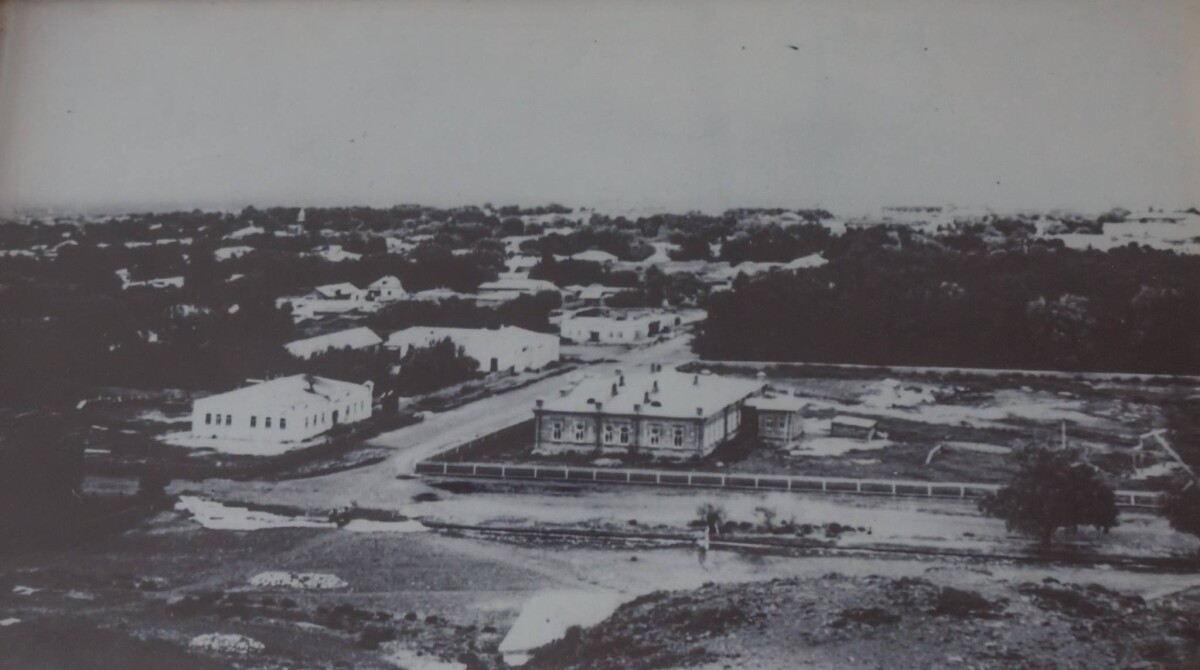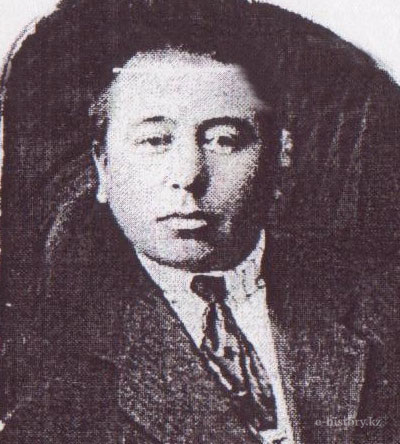
The Tuzakshy family lived on the shore of the Black Irtysh (the upper course of the Irtysh River, from the source to the confluence of Lake Zaisan); it was the southern side of the Altay and the northern side of Sauyr. In the noble family of Satybaldy of the Tuzakshy family, in 1861 Bekmukhambet was born. The family had four sons: Suleimen, Begaly, Bekmukhambet, and younger son Zhagypar. Among the brothers, the third was the most single-minded. Elder brother Suleimen, delighted with the grasp of Begaly and Bekmukhambet, created all the conditions for their education. He made sure that they received a religious education in Tashkent. And in the 80 years of the XIX century two young people from Zaisan went to Tashkent, where they studied for seven years in a madrasah. Then, having finished madrasah, they went to Ufa, and after passing the exam they received a document showing that the bearer of the document was the mullah. It was a religious position appointed by Tsarist Decree. The post of the mullah was introduced by the Russian Senate in 1868. According to this document, the activities of the mullah were determined, and his duties were approved.
In this document, there were the following articles:
• On religious matters, the Kazakhs belonged to the Orenburg Muftiyat;
• Only the appointed mullah has the right to lead local spiritual affairs of the Kazakhs;
• Mullah submitted to the civil administration and through it to the Ministry of Internal Affairs;
• Mullahs were appointed and dismissed by decision of the regional administration and the military governor;
• The mosques were built only with the permission of the governor-general;
• For the opening of a madrasah in the mosque for the education of children, you must always obtain permission from the head of the county.
Upon returning to his native village, Bekmukhambet having consulted the elders of the aul and the office of the governor-general, the county governor, began the construction of the mosque. Based on his knowledge and on the document on hand, he did not doubt the success of the planned case. He planned not only the construction of the mosque, but also the construction of the school. A local historian Kalibek Altybayev says: "Here (in Zaisan) in 1903 an elementary school was opened, Tsar himself appointed the mullah a literate teacher Bekmukhambet Satybaldyuly. This school taught mathematics, geography, and Russian." And a famous writer Uakhap Kydyrkhanuly in his interview said: "My father Kydyrkhan was one of the first educated, literate people in Zaisan. He studied at a school opened in 1903 by the mullah named Bekmukhambet, Mirzhakip Dulatov taught him. Then he graduated from the Zaisan madrasah."
Bekmukhambet built a school on the eastern side of the Sergazy River and ordered two children from each volost to be trained. Financial help in the construction of the mosque and school was provided by his faithful friend Bidakhmet Bobkin, a large rich man of Zaisan. In the family of Bekmukhambet, respected by the people, two sons appeared: in 1898 Adambek was born, and in 1900 Gadilbek. They were the first pupils of the father's school, where Mirzhakip taught. Later, on the advice of Mirzhakip Dulatov, Adambek entered the Semipalatinsk teacher's seminary, and Gadilbek went to study in Turkey. He studied for three years in the Sultaniya madrasah, located in the city of Bursa, and in 1915 became ill with tuberculosis, died suddenly. About the death of his son, the father found out only three years later.

Adambek was a member of the Alash party of the "Tendik" branch, which opened in 1918 in Zaisan, and was commander of the Alash army. Adambek remained in history as one of the first officers of Zaisan, who taught military art one of two regiments of Alash forces. For training the Kazakh youth to military affairs 32-year-old Adambek was arrested and sent to Semipalatinsk prison, where he was killed. In the article “Mullah Bekmukhambet”, the veteran of labor Kokenai Matzhanov cited the words of his (Adambek) daughter Halima Bekmakhanova:
"I have been persecuted and tormented since I was five. I brought-up descendants; I saw my great-grandsons. When I was five, my father Adambek was imprisoned in Semipalatinsk prison, accusing: "You are an Alash officer. You fought along with the whites against the Soviet power." He was killed there, in prison. My mother Aisha took her children and her father's family in Tashkent. Accusing her of being the wife of an officer of the Alash party, from May 26, 1938 to May 5, 1939, my mother was imprisoned for one year. And my mother's father, Bidakhmet Bobkin, my grandfather, was arrested in 1937 in Tashkent on charges of "You helped the troops of Alash, you are a rich man, a merchant"; he disappeared without a trace. We do not know where he died. My grandfather Bekmukhambet, father Adambek, mother Aisha, mother's father Bidakhmet, and my husband Yermukhan - they all served the people."
The Kazakhs suffered from the migrant peasants who, using various orders-decrees of the tsarist administration moved from Russia. They relied on the support of the armed and brutal Russian Cossack troops. They unceremoniously seized fertile lands along the banks of Zharly, Kenderlik. Peasants looked down on nomadic way of life, on traditional cattle-breeding, on their actions to preserve and improve the quality of the fertile lands of local Kazakhs who have lived on this land for centuries. The Russians, not even having permits, sowed bread, put up tents, and on the pretext that "they would crush my bread," they collected 30-40 kopecks from each family. If they did not give, then the Russians came out with rifles and did not let them drive the cattle, they did not let them wander," Mirzhakip Dulatov writes in his notes. Such actions aroused the anger of respected among the people persons such as Zhapabay Bitibayuly and Bekmukhambet Satybaldyuly.
"Bekmukhambet since 1904 was friends with Mirzhakip Dulatov, conferred with him on various issues," says Themistocles Zhunussov, a local historian.
"Bekmukhambet was given a legal document of “the Mullah”, it is a religious post approved by the tsar's decree, an official document issued according to all the rules," the local historian said. The elders were powerless against the district chiefs who did not heed their complaints. Perturbed by such acts, Bekmukhambet’s group, having secretly consulted Mirzhakip’s group, began to take bold steps. They armed the dzhigits with spears, partially with rifles, hiding them in osier-bed, and summoned the respected people for talks. During the meeting, they surrounded and tied them up. And Bekmukhambet said: "Your life does not represent any price. County chiefs and lawyers are far away, now we will kill you." The peasants began to cry bitter tears. After such resistance, the peasants-settlers "came down to earth", repented and came to an agreement. Bekmukhambet mullah, having persuaded his relatives to receive 15 acres of land from the tsarist power, settled on the banks of the Sergazy River. And a new Kazakh aul appeared in this land. By the fifth anniversary of the formation of the aul it was given the name "Kuanysh".

These historical events were written on the basis of extensive studies of Zaisan's chronicle of the late writer Galym Baybatyrov. A prominent figure, the elder Bekmukhambet Satybaldyuly was hit by the sudden death of his son Gadilbek. In a letter to Mirzhakip he wrote: "Dear Mirzhakip! I wanted my Gadilbek, the light of my soul, my hope, to serve my people. But I suffered a misfortune. My soul is burning, my heart is burning." A few years later, in 1925, he, exhausted from grief and loss of his son, left this mortal world.
As part of the modernization of public consciousness, we are obliged to recognize Bekmukhambet Satybaldyuly as a passionate personality who educated and created all conditions for education, raised sons - patriots of the country, devoted to Alash till the last breath.
Translated by Raushan MAKHMETZHANOVA
